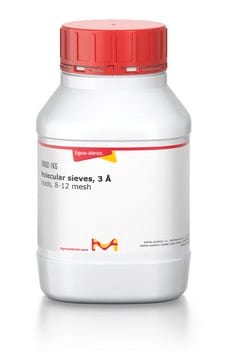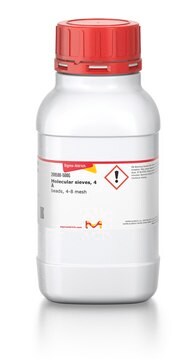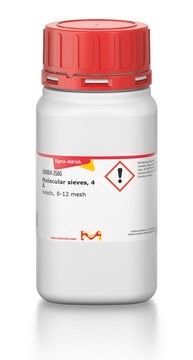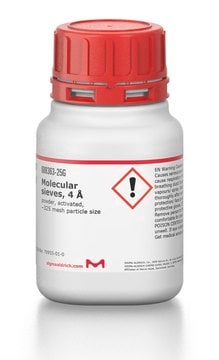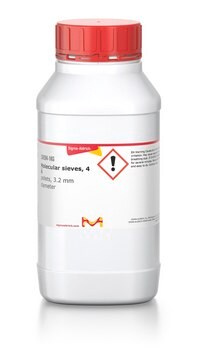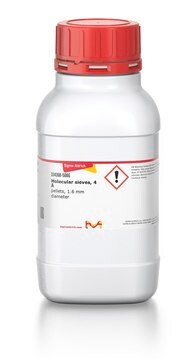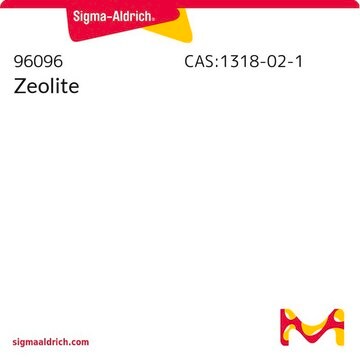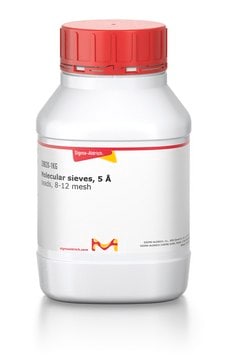208574
Molecular sieves, 3 Å
beads, 4-8 mesh
Synonym(s):
Molecular Sieve UOP Type 3Å
Sign Into View Organizational & Contract Pricing
All Photos(1)
About This Item
Linear Formula:
KnNa12-n[(AlO2)12(SiO2)12] · xH2O
CAS Number:
MDL number:
UNSPSC Code:
23201100
eCl@ss:
32110204
NACRES:
NB.24
Recommended Products
Looking for similar products? Visit Product Comparison Guide
Related Categories
General description
Molecular sieves are crystalline metal aluminosilicates having a 3-dimensional interconnecting network of silica and alumina tetrahedra. Natural water of hydration is removed from this network by heating to produce uniform cavities which selectively adsorb molecules of a specific size. The 3A form is made by substituting potassium cations for the inherent sodium ions of the 4A structure, reducing the effective pore size to ~3Å, excluding diameter >3Å, e.g., ethane. The 4 to 8-mesh type is normally used in gas-phase applications. Molecular sieves are considered a universal drying agent in polar and nonpolar media.
Application
Molecular sieves have been used for the drying of dimethyl sulfoxide.
They may also be used in the following:
They may also be used in the following:
- Synthesis of ecteinascidin 743 (a potential marine-derived antitumor agent).
- Preparation of vanillyl nonanoate (a model capsinoid compound).
- Highly enantioselective Friedel-Crafts alkylation of indoles with nitroalkenes.
Molecular sieves, 3 Å may be used in the following processes:
- As a general-purpose drying agent in polar and nonpolar media.
- Commercial dehydration of unsaturated hydrocarbon streams, including cracked gas, propylene, butadiene, acetylene
- Drying polar liquids such as methanol and ethanol.
- Adsorption of molecules such as NH3 and H2O from a N2/H2 flow.
Storage Class Code
13 - Non Combustible Solids
WGK
WGK 3
Flash Point(F)
Not applicable
Flash Point(C)
Not applicable
Certificates of Analysis (COA)
Search for Certificates of Analysis (COA) by entering the products Lot/Batch Number. Lot and Batch Numbers can be found on a product’s label following the words ‘Lot’ or ‘Batch’.
Already Own This Product?
Find documentation for the products that you have recently purchased in the Document Library.
Customers Also Viewed
Muhammad Naziz Saat et al.
Biotechnology and applied biochemistry, 67(3), 354-365 (2019-11-21)
One-pot synthesis of sugar-functionalized oligomeric caprolactone was carried out by lipase-catalyzed esterification of ε-caprolactone (ECL) with methyl-d-glucopyranoside (MGP) followed by the elongation of functionalized oligomer chain. Functionalization was performed in a custom-fabricated glass reactor equipped with Rushton turbine impeller and
Infrared spectroscopy studies on stability of dimethyl sulfoxide for application in a Li?air battery
Mozhzhukhina N, et al.
The Journal of Physical Chemistry C, 117(36), 18375-18380 (2013)
Chiral phosphoric acid catalyzed enantioselective Friedel-Crafts alkylation of indoles with nitroalkenes: cooperative effect of 3 A molecular sieves.
Junji Itoh et al.
Angewandte Chemie (International ed. in English), 47(21), 4016-4018 (2008-04-18)
Enantioselective total synthesis of ecteinascidin 743.
Corey EJ, et al.
Journal of the American Chemical Society, 118(38), 9202-9203 (1996)
Kenji Kobata et al.
Bioscience, biotechnology, and biochemistry, 66(2), 319-327 (2002-05-10)
Capsinoids are a novel group of compounds produced by the Capsicum plant. We synthesized a capsinoid by the lipase-catalyzed esterification of vanillyl alcohol with fatty acid derivatives in an organic solvent. The use of seven out of 17 commercially available
Our team of scientists has experience in all areas of research including Life Science, Material Science, Chemical Synthesis, Chromatography, Analytical and many others.
Contact Technical Service